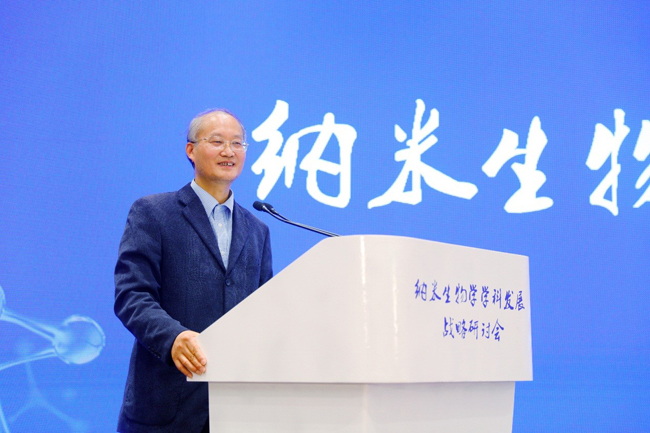Prof Dai-wen Pang was elected as AIMBE Fellow
On 15 February 2021, the American Institute for Medical and Biological Engineering (AIMBE) announced the election of 174 new members as AIMBE Fellows in recognition of their outstanding achievements in medical and biological engineering. Prof. Dai-Wen Pang, College of Chemistry, Nankai University, was elected for outstanding contributions to the development of quantum dot-based methodologies for single-virus tracking. Other four Chinese scientists, Academician Kwok-fai So (Jinan University), Academician Lanjuan Li (Zhejiang University), Academician Shusen Zheng (Zhejiang University), Prof. Chunying Chen (NCNST) were elected to the AIMBE College of Fellows at the same time.

Prof. Dai-wen Pang, B.S. in chemistry (1982), Ph.D. in physical chemistry (1992) from Wuhan University. In 1994 he received a postdoctoral certificate and became an Associate Professor at Wuhan University in Institute of Virology . He received a special promotion to Professor in 1996. In 1998 he worked as a doctoral advisor in analytical chemistry. During 2001 and 2005, he continued his career as dean of College of Chemistry and Molecular Sciences, Wuhan University. Since 2018, Prof. Pang has been a Professor at College of Chemistry, Nankai University. He worked as a member of the Steering Committee of the National Basic Research Program of “Nano Research” (973 Program) (2011-2017), the expert group for the implementation program (2015) and guidance (2016-2020) of the National Key R&D Plan of Nanotechnology. He was a member of Editorial Broad of Journal of Electroanalytical Chemistry (Elsevier) during 2005 and 2015. He also currently serves as a member of the National Steering Committee for Nanotechnology, a member of the Editorial Advisory Board of Analytical Chemistry (ACS) and an associate editor for New Journal of Chemistry (RSC).
Prof. Pang’s research interests mainly focus on dynamic bioimaging (QDs-based single-virus tracking) and QDs-based backlight display. He was the principal investigator of a project supported by the National Science Fund for Distinguished Young Scholars (2000), as well as academic leader of several national scientific organizations such as National Natural Science Foundation of China Innovation Research Group (2006-2012), the National Key Program for Infectious Disease of China (2009-2010;2018-2020). He was twice appointed as 973 chief scientist (2006-2010;2011-2015). Prof. Pang has published more than 370 SCI papers with SCI citation over 18,000, obtained 35 innovation patents, delivered over 240 domestic/overseas lectures. He worked for national standardization of QDs technology at the National Technical Committee 279 on Nanotechnology of Standardization Administration of China (2009;2018). His researches awarded: QDs-based fluorescent labeling reagents won Excellent Product Award at the Seventh Session of Chinese International Hi-Tech Fair (2005); the achievement on “Synthesis of nanomaterials such as quantum dots in live cells” was selected to showcase at the Exhibition (7-13 Mar 2011, Beijing) of the National Major Science & Technology Achievements of China during “The 11th Five-year Plan” Period (2006-2010); “Live-cell synthesis of fluorescent semiconductor nanocrystals and tuning of their properties for biolabeling”(lead author) was awarded the First Award of the Natural Science Prize of Hubei Province of China (2017); “DNA Surface Chemistry and DNA-Based Biosensing”(lead author) won the First Award of the Natural Science Prize of the Ministry of Education of China (2006). Semiconductor CdSe multicolor fluorescence QDs are synthesized in living cells at a temperature of 30°C instead of 300 by chemical reactions and can be customized uniformly, which is promising for backlight display and high-quality biomarkers.
AIMBE belongs to United States National Academy of Sciences (NAS), committed to bringing innovations in medical and biological engineering. Fellows of the AIMBE (FAIMBE) is top academic recognition in the fields, representing more than 2,000 individuals who are the most distinguished biomedical and biological engineers worldwide. Potential Fellows are nominated by existing Fellows, reviewed by peers, then voted upon by the entire fellowship. Candidates elected will be formally inducted during the AIMBE Annual Event, this year on 26 March.

